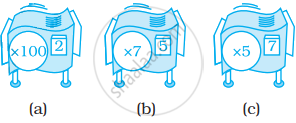Advertisements
Advertisements
Question
The table shows the mass of the planets, the sun and the moon in our solar system.
| Celestial Body |
Mass (kg) | Mass (kg) Standard Notation |
| Sun | 1,990,000,000,000,000,000,000,000,000,000 | 1.99 × 1030 |
| Mercury | 330,000,000,000,000,000,000,000 | |
| Venus | 4,870,000,000,000,000,000,000,000 | |
| Earth | 5,970,000,000,000,000,000,000,000 | |
| Mars | 642,000,000,000,000,000,000,000,000,000 | |
| Jupiter | 1,900,000,000,000,000,000,000,000,000 | |
| Saturn | 568,000,000,000,000,000,000,000,000 | |
| Uranus | 86,800,000,000,000,000,000,000,000 | |
| Neptune | 102,000,000,000,000,000,000,000,000 | |
| Pluto | 12,700,000,000,000,000,000,000 | |
| Moon | 73,500,000,000,000,000,000,000 |
- Write the mass of each planet and the Moon in scientific notation.
- Order the planets and the moon by mass, from least to greatest.
- Which planet has about the same mass as earth?
Solution
a. Mass of each planet and Moon in scientific notation is given below:
Using law of exponents, am × an = am + n
Sun = 199 × 1028
= 1.99 × 1028 × 102
= 1.99 × 1030
Mercury = 33 × 1022
= 3.3 × 1022 × 10
= 3.3 × 1023
Venus = 487 × 1022
= 4.87 × 1022 × 102
= 4.87 × 1024
Earth = 597 × 1022
= 5.97 × 1022 × 102
= 5.97 × 1024
Mars = 642 × 1027
= 6.42 × 1027 × 102
= 6.42 × 1029
Jupiter = 19 × 1026
= 1.9 × 1026 × 10
= 1.9 × 1027
Saturn = 568 × 1024
= 5.68 × 1024 × 102
= 5.68 × 1026
Uranus = 868 × 1023
= 8.68 × 1023 × 102
= 8.68 × 1025
Neptune = 102 × 1024
= 1.02 × 1024 × 102
= 1.02 × 1026
Pluto = 127 × 1020
= 1.27 × 1020 × 102
= 1.27 × 1022
Moon = 795 × 1020
= 7.95 × 1020 × 102
= 7.95 × 1022
b. Order of mass of all planets and Moon from least to greatest
Pluto < Moon < Mercury < Venus < Earth < Uranus < Neptune < Saturn < Jupiter < Mars
c. Venus has about the same mass as Earth.
APPEARS IN
RELATED QUESTIONS
The diameter of the Sun is 1.4 × 109 m and the diameter of the Earth is 1.2756 × 107 m.
The table shows the average distance from each planet in our solar system to the sun.
| Planet | Distance from Sun (km) |
Distance from Sun (km) Standard Notation |
| Earth | 149,600,000 | 1.496 × 108 |
| Jupiter | 778,300,000 | |
| Mars | 227,900,000 | |
| Mercury | 57,900,000 | |
| Neptune | 4,497,000,000 | |
| Pluto | 5,900,000,000 | |
| Saturn | 1,427,000,000 | |
| Uranus | 2,870,000,000 | |
| Venus | 108,200,000 |
- Complete the table by expressing the distance from each planet to the Sun in scientific notation.
- Order the planets from closest to the sun to farthest from the sun.
Suppose you have a stretching machine which could stretch almost anything. For example, if you put a 5 metre stick into a (× 4) stretching machine (as shown below), you get a 20 metre stick. Now if you put 10 cm carrot into a (× 4) machine, how long will it be when it comes out?

Two machines can be hooked together. When something is sent through this hook up, the output from the first machine becomes the input for the second. Which stretching machine does the same work as two (× 2) machines hooked together?
  |
For the following repeater machines, how many times the base machine is applied and how much the total stretch is?

Find three repeater machines that will do the same work as a (× 64) machine. Draw them, or describe them using exponents.
What will the following machine do to a 2 cm long piece of chalk?

Neha needs to stretch some sticks to 252 times their original lengths, but her (× 25) machine is broken. Find a hook-up of two repeater machines that will do the same work as a (× 252) machine. To get started, think about the hookup you could use to replace the (× 25) machine.

Find two repeater machines that will do the same work as a (× 81) machine.
The left column of the chart lists the lengths of input pieces of ribbon. Stretching machines are listed across the top. The other entries are the outputs for sending the input ribbon from that row through the machine from that column. Copy and complete the chart.
| Input Length | Machine | |||
| × 2 | ||||
| 1 | 5 | |||
| 3 | 15 | |||
| 14 | 7 | |||
